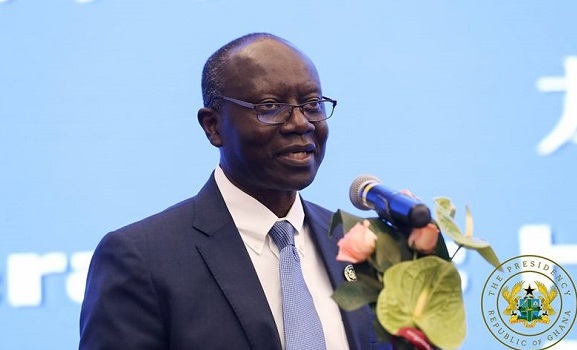The latest official Gross Domestic Product (GDP) data released by the Ghana Statistical Service (GSS) for 2020 and 2021 shows that the economy has expanded more than was anticipated and exceeded the Sub-Saharan Africa (SSA) average growth of 4.5 percent for 2021, while the rate of debt accumulation has slowed to pre-pandemic levels. Fiscal expansion has also slowed.

On 20th April, 2022, the official provisional 2021 fourth quarter and overall 2021 annual GDP data were released by the Ghana Statistical Service (GSS).
According to the GSS, real GDP expanded by 7 percent in the fourth quarter of 2021 compared to the 4.3 percent growth recorded in the corresponding period of 2020. Similarly, non-oil real GDP in the fourth quarter of 2021 expanded by 7.6 percent compared to 5.7 percent for the same period in 2020.
On an annual basis, the provisional real GDP growth for 2021 showed a positive outturn of 5.4 percent, exceeding the 4.4 percent 2021 projected outturn by 1 percentage point and the SSA average growth by 0.9 percentage point.
This is a clear confirmation that the economy is on the rebound post the COVID-19 pandemic that saw a revised growth rate of only 0.5 percent in 2020.

Similarly, the non-oil real GDP expanded from 1.0 percent in 2020 to 6.9 percent in 2021 (the highest non-oil real GDP growth rate since the rebasing was done in 2013) exceeding the target of 5.9 percent for the period.
The Nominal GDP for 2021 is estimated at GH¢459,130.9 million, over GH¢18 billion more than the projected outturn of GH¢440,869.4 million for the period, up from GH¢391,940.7 million recorded in 2020.
The Non-oil nominal GDP for 2021 is GH¢437,975.2, up from GH¢378,147.9 million in 2020.
The major implication of this higher-than-projected GDP outturn for 2021 is that all economic indicators expressed as a ratio of GDP will change to reflect the updated GDP data. These ratios include the debt to GDP ratio, a key factor in determining debt sustainability, the fiscal deficit to GDP ratio, and Revenue to GDP ratio.
The new GDP data also has implications for the nominal 2022 GDP target and the growth rate as it is based on the 2021 GDP data which have now been updated.
The fiscal deficit (including energy and Finsec payments) is now showing a decline (as a percent of GDP) from 15.0 percent to 14.7 percent of GDP for 2020. Similarly, the fiscal deficit of 2021 has reduced from 11.7 percent to 11.4 percent.
Ghana’s public debt stock expressed as percentage of GDP now stands at 76.6 percent of GDP at the end of 2021 compared to the earlier reported 80.1 percent. Similarly, the 2020 debt stock has also reduced from 76.1 percent to 74.4 percent, a further confirmation that the rate of debt accumulation has slowed to pre-pandemic levels.
“As such, the Ministry of Finance will update its debt sustainability analysis (DSA) and revise its GDP projections for 2022 and the medium-term to reflect the positive developments in 2021 as well as recent policy decisions which have a bearing on sustaining the momentum towards robust economic growth,” a statement issued by the Finance Ministry on Wednesday April 27 said.
“These developments are positive and confirm the fact that, the economy is rebounding post-COVID-19, the rate of debt accumulation is tapering off, and there is a slowdown in fiscal expansion with Ghana on track to return to the Fiscal Responsibility Act deficit threshold of 5 per cent of GDP by 2024,” the statement added.
Source: 3news.com


